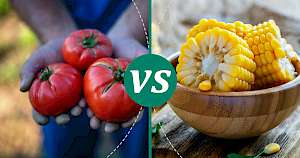Corn vs Tomato: Nutrition & Calories Compare


Corn vs Tomato
Nutrition Facts
Serving size:
change
5g10g15g20g30g40g50g60g80g100g120g140g160g180g200g220g250g300g350g400g450g500g600g700g800g900g1000g
1oz2oz3oz4oz5oz6oz7oz8oz10oz12oz15oz20oz25oz30oz35oz40oz50oz
Amount Per Serving:
Serving size:
change
5g10g15g20g30g40g50g60g80g100g120g140g160g180g200g220g250g300g350g400g450g500g600g700g800g900g1000g
1oz2oz3oz4oz5oz6oz7oz8oz10oz12oz15oz20oz25oz30oz35oz40oz50oz
Amount Per Serving:
Corn vs Tomato 100g Compare
| per 100g | Corn | Tomato |
|---|---|---|
| Calories | 86 | 18 |
| Carbohydrates | 14.69 g | 3.9 g |
| Fat | 1.63 g | 0.2 g |
| Dietary fiber | 2.43 g | 1.2 g |
| Protein | 2.79 g | 0.9 g |
| Calcium | 0.656 mg | 10 mg |
| Iron | 0.388 mg | 0.3 mg |
| Magnessium | 25.76 mg | 11 mg |
| Phosphorus | 2.513 mg | 24 mg |
| Potassium | 237 mg | 237 mg |
| Zink | 2.513 mg | 0.17 mg |
| Vitaminium A | 187 µg | 833 µg |
| Vitaminium B1 (Thiamine) | 0.079 mg | 0.037 mg |
| Vitaminium B3 (Niacin) | 1.593 mg | 0.594 mg |
| Vitaminium B6 | 0.15 mg | 0.08 mg |
| Vitaminium B9 (Folic acid) | 42 mg | 15 mg |
| Vitaminium C | 6.8 mg | 13 mg |
| Vitaminium E | 0.07 mg | 0.54 mg |
| Vitaminium K | 0.3 µg | 7.9 µg |
| Beta karoten | 16 mg | 101 mg |
A Closer Look at Corn and Tomato: A Nutritional Perspective
When it comes to choosing between corn and tomato, most people might base their decision on taste preference alone. However, diving deeper into the nutritional aspects of these two popular foods reveals a fascinating comparison. Both corn and tomato are staples in various cuisines around the world, celebrated not only for their flavors but also for their health benefits. Let's embark on a journey to explore these two foods beyond the surface.
The Nutritional Content of Corn and Tomato
At first glance, corn and tomato may seem like ordinary ingredients. However, they pack a surprising nutritional punch. A serving of corn (100g) contains approximately 86 calories, while a similar serving of tomato has only 18 calories. This stark difference in calorie content makes tomato a preferred option for those monitoring their calorie intake.
Corn is rich in carbohydrates, with 18.7g per serving, making it a good source of energy. Tomatoes, on the other hand, contain only 3.9g of carbohydrates. Both are decent sources of fiber, with corn providing 2g and tomato 1.2g, aiding in digestion and promoting a feeling of fullness.
When it comes to fats, corn contains 1.35g, whereas tomato has a minimal 0.2g, making tomatoes a low-fat option. Despite the low fat content, both foods have negligible amounts of saturated fat and cholesterol, aligning with heart-healthy diets.
Protein levels are modest in both, with corn offering 3.27g and tomato providing 0.9g. This makes corn a slightly better option for those looking to increase their protein intake.
Minerals and Vitamins Galore
Both corn and tomato are rich in vitamins and minerals, contributing to their overall nutritional value. Corn is a good source of magnesium (37mg) and potassium (270mg), essential for muscle and nerve function. Tomatoes shine with their high vitamin C content (13mg) and vitamin A (833 IU), which are crucial for immune health and vision, respectively.
Moreover, tomatoes offer a higher amount of calcium (10mg) than corn (2mg), beneficial for bone health. Iron, zinc, and phosphorus are present in both, with corn slightly leading in iron and zinc content, while tomatoes provide a good dose of phosphorus.
The richness in B vitamins is notable in both foods, with corn having higher amounts of vitamins B3 and B5, and tomatoes excelling in vitamin B9 (folate). These vitamins play vital roles in energy production and cell health.
Antioxidant Properties
Tomatoes are renowned for their antioxidant properties, thanks to the high levels of vitamin C, vitamin E, and beta-carotene. These antioxidants protect the body from free radicals, potentially reducing the risk of chronic diseases. Corn, while not as rich in these specific antioxidants, still offers nutritional benefits that contribute to overall health.
Which One to Choose?
Deciding between corn and tomato depends on individual dietary needs and preferences. For those watching their calorie intake or seeking foods high in vitamins A and C, tomatoes are an excellent choice. Corn, with its higher carbohydrate and protein content, may be more suited for those needing extra energy or looking to increase their protein intake.
In the end, both corn and tomato offer unique nutritional benefits. Incorporating a variety of foods into your diet is key to obtaining a broad spectrum of nutrients. Whether you prefer the sweet crunch of corn or the juicy freshness of a tomato, you can rest assured that you're making a healthy choice.
So, the next time you're pondering over corn vs. tomato, remember that each has its own place in a balanced diet. Why not enjoy both and reap the diverse nutritional benefits they offer?
Corn 100g
86kcalCalories source
- 69% CARBS.
- 13% PROTEIN
- 17% FAT
100g | ounce | single piece | tablespoon | teaspoon | cup | half cup | small can | medium can
Tomato 100g
18kcalCalories source
- 74% CARBS
- 17% PROTEIN
- 9% FAT
Compares of corn
- Corn vs Asparagus
- Corn vs Bamboo Shoots
- Corn vs Beetroot
- Corn vs Broccoli
- Corn vs Brussels Sprouts
- Corn vs Butternut Squash
- see all compares of corn
Marcin Piotrowicz
calories-info.com creator
Healthy diet and healthy lifestyle promoter
Add comment